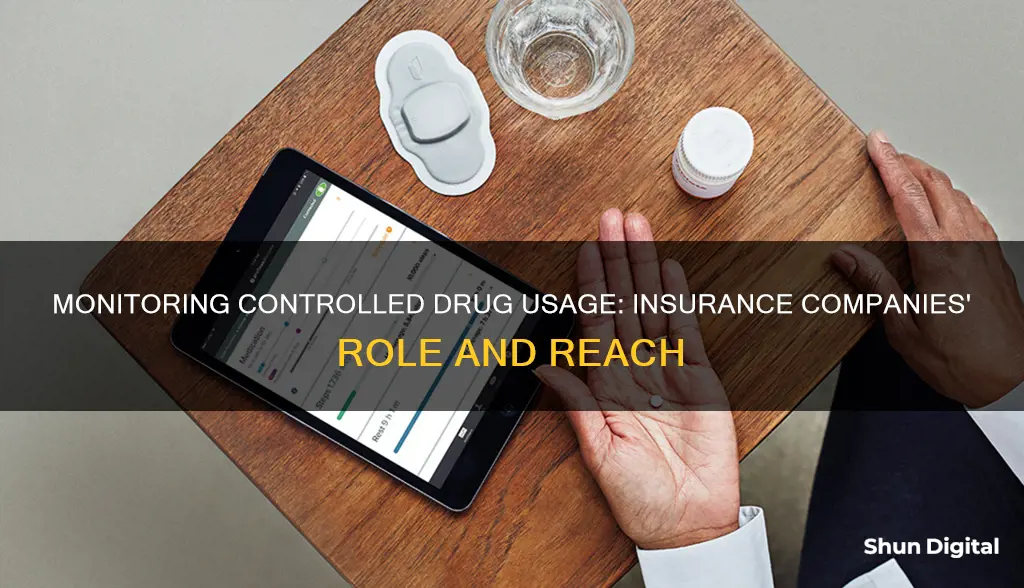
Insurance companies have the right to require drug tests for health and life insurance policies, but requests for testing are uncommon. However, if signs of drug abuse are detected, insurers may demand higher premiums or refuse to provide coverage. Testing is more common in professions where the health and safety of others is a primary concern, such as pilots and heavy equipment operators. When applying for life insurance, individuals are typically asked about their use of alcohol, tobacco, and illegal substances, and may be subject to medical exams that include blood and urine tests for drug, alcohol, and nicotine use. While casual substance users generally face few issues in obtaining life insurance, heavy drinkers and users of illegal drugs are likely to be denied coverage. Recovering substance users may need to demonstrate a period of sobriety before becoming eligible for traditional coverage.
| Characteristics | Values |
|---|---|
| Insurance companies' right to require drug tests | Yes |
| Frequency of drug tests | Uncommon |
| Reasons for drug tests | Signs of drug abuse |
| Drug test methods | Urine screen, blood and urine tests |
| Substances tested for | Marijuana, methamphetamines, opiates, benzodiazepines, cocaine, nicotine, alcohol |
| Drug test results | Private |
| Drug test refusal consequences | Loss of employment, loss of policy, higher premiums |
| Drug test failure consequences | Loss of employment, loss of policy, higher premiums |
What You'll Learn
- Insurance companies can require drug tests for health and life insurance policies
- Drug tests are more common for individual private policies than group policies
- Insurers can demand higher premiums or refuse to cover individuals if they show signs of drug abuse
- Insurers test for a range of drugs, including marijuana, methamphetamines, opiates, and cocaine
- People who drink casually or use marijuana generally have few issues getting life insurance

Insurance companies can require drug tests for health and life insurance policies
Insurance companies have the right to require drug tests for health and life insurance policies, but requests for testing are uncommon. Insurers are in the business of managing risk, and those who use drugs, even recreationally, tend to have higher risks for illness and disease than those who don't. If an insurance company sees signs of drug abuse, they might demand higher premiums or refuse to cover the individual.
Life insurance companies often require a urine test during the application process to check for illegal drug and nicotine use, as well as liver and kidney problems, and other chronic health conditions. The urine test is more likely to reveal drugs in your system, especially if you have taken something recently. Blood tests, on the other hand, can reveal many health issues that you have now or are developing.
The chances of insurance companies requiring drug testing increase if a person is applying for an individual private policy. If you are being charged a higher rate and have not undergone a test, you may request one to see if that might lower your premium, although this is not typically done.
Drug testing is more common in professions where the health and safety of others is a primary concern, such as pilots and heavy equipment operators. Doctors often schedule appointments at applicants' homes shortly after applying for the policy, so applicants do not have time to get the drugs or alcohol out of their systems.
If a person fails a drug test administered by an insurance company, this might result in loss of employment, loss of the policy, or an increase in insurance premiums. There are usually no legal ramifications except in the case of harm to others. Drug test results are generally regarded as private, and it is illegal for insurance companies to release the results to a third party.
Monitoring Children's Internet Usage: Parenting in the Digital Age
You may want to see also

Drug tests are more common for individual private policies than group policies
Drug tests are more common for individual private policies than for group policies. This is because group policies are adjusted to account for risk factors, including recreational drug use, due to the large number of people they cover.
Insurance companies have the right to require drug tests for health and life insurance policies, but requests for testing are uncommon. However, if an insurance company sees signs of drug abuse, they may demand higher premiums or refuse to cover the individual. Testing is more likely to occur for individual private policies, and there is a good chance that if a test is not required, a higher premium is being charged to mitigate the risk.
Insurance companies are in the business of managing risk, and those who use drugs, even recreationally, tend to have higher risks for illness and disease than those who don't. Managing risk and keeping it low means insurers can better manage their payouts.
Monitoring Internet Usage: Strategies for Parents and Guardians
You may want to see also

Insurers can demand higher premiums or refuse to cover individuals if they show signs of drug abuse
While insurance companies have the right to require drug tests for health and life insurance policies, requests for testing are uncommon. However, if signs of drug abuse are detected, insurers may demand higher premiums or refuse to cover individuals. This is because those who use drugs, even recreationally, tend to have higher risks for illness and disease than those who don't, and insurers want to keep their payouts low.
In most cases, those joining a group policy through an employer are not tested for drugs. Testing is more common in professions where the health and safety of others is a primary concern, such as pilots and heavy equipment operators. The chances of testing increase if someone is applying for an individual private policy. If a test is not required, a higher health insurance premium is often charged to mitigate the risk.
In the context of life insurance, casual substance users can generally find coverage. However, a documented history of drug or alcohol abuse could raise the cost of premiums or make it more difficult to get covered. Heavy drinkers or users of illegal drugs will likely be denied coverage. Recovering substance users may need to demonstrate a period of sobriety before qualifying for traditional coverage. This period is typically longer for illegal drugs than for alcohol.
In the context of health insurance, insurers will often cover the cost of treatment for substance use disorder and mental health conditions. However, the specific health insurance plan will determine how much of the treatment is covered and how much the individual will need to pay out-of-pocket.
Monitoring Data Usage on iPhone: Tips and Tricks
You may want to see also

Insurers test for a range of drugs, including marijuana, methamphetamines, opiates, and cocaine
Insurers test for a wide range of drugs, including marijuana, methamphetamines, opiates, and cocaine. They may also test for amphetamines, barbiturates, benzodiazepines, cannabinoids, methadone, opioids, phencyclidine (PCP), and propoxyphene.
The tests are usually carried out on urine samples, although hair analysis can also be used to detect illicit substance use. Urine tests can detect most substances for approximately 2 to 4 days, although chronic use of substances like marijuana, PCP, and benzodiazepines may be detectable for up to 30 days.
Insurers have the right to require drug tests for health and life insurance policies, but such requests are rare. Drug testing mostly happens in professions where the health and safety of others is a primary concern, such as pilots and heavy equipment operators. If an insurer sees signs of drug abuse, they might demand higher premiums or refuse to provide coverage.
Monitoring KWH Usage: A Simple Guide to Energy Tracking
You may want to see also

People who drink casually or use marijuana generally have few issues getting life insurance
Life insurance companies have the right to require drug tests for health and life insurance policies, but requests for testing are uncommon. While casual drinkers and marijuana users may not face issues getting life insurance, they may experience higher premiums. Marijuana use is associated with higher risks for illness and disease, and insurers will take steps to ensure that their customers are low-risk.
Marijuana users can qualify for both term life and permanent life policies. Each insurance company has its own guidelines for how cannabis use affects whether someone is approved for coverage and what they'll pay in premiums. Some companies are more lenient than others, so it's important to compare quotes and work with an independent broker who understands how different companies evaluate marijuana use.
When evaluating life insurance applications, underwriters consider various factors, including age, gender, height, weight, health status, and lifestyle habits. They may also request specific records, such as driving records, prescription history, and medical records. Marijuana use is just one factor among many that influences an applicant's risk classification.
The frequency and method of marijuana consumption play a significant role in the underwriting process. Occasional use may have minimal impact on premiums, especially if the applicant tests negative for THC during a drug screening. However, daily use could lead to higher premiums or even a decline of coverage. Insurance companies generally view ingesting marijuana through edibles, oils, or vaporizers more favorably than smoking.
It is crucial to be honest about marijuana use on life insurance applications. Misrepresenting information could result in a denied or cancelled policy, or the insurance company might void the policy later if they discover the misrepresentation.
In summary, casual drinkers and marijuana users can generally obtain life insurance, but they may face higher premiums depending on the insurance company and various individual factors. Working with an independent broker and comparing quotes from different companies can help individuals find the most suitable coverage at the best available rates.
Colleges Monitoring Student Online Activity: Is Privacy Invasive?
You may want to see also
Frequently asked questions
Insurance companies have the right to require drug tests for health and life insurance policies, but requests for testing are uncommon. If an insurance company sees signs of drug abuse, they might demand higher premiums or refuse to cover the individual.
Generally, a failed drug test will result in either the loss of employment or an increase in insurance premiums. There are usually no legal ramifications except in the case of a failed drug test causing harm to others.
If an insurance company does choose to test for drugs, some of the drugs it might test for with a urine screen include marijuana, methamphetamines, opiates, benzodiazepines, and cocaine.
Failing a drug test might mean loss of employment, loss of the policy, or raising of insurance premiums. There are usually no legal ramifications.







